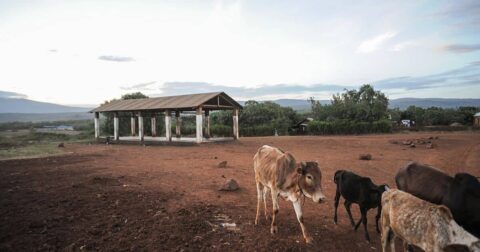Explainer
The Deep History of Racism and Speciesism Behind ‘They’re Eating the Dogs’
Election 2024•7 min read
Reported
A growing chorus of animal advocates and researchers argue farm animal gifts cause more harm than good.


Words by Jessica Scott-Reid
It’s that time of year again. Glossy campaign materials are shoved into mailboxes and flooded into inboxes. On them, smiling children hold farmed animals — goats, sheep, rabbits and chickens. According to various campaigns from groups including World Vision, Oxfam, Canadian Save the Children and Heifer International, these farm animals are life-saving gifts for families in need in countries such as Uganda, Tanzania and Guatemala.
The animals offer both food and hope, the marketing materials claim. For a donation as low as $25, for example, a pair of live chickens can be gifted to a family in Rwanda. But a variety of animal, environmental and food security organizations along with scientists including Dr. Jane Goodall, have in recent years advocated against gifting farm animals, arguing these efforts end up causing more harm than good.
According to the organization’s own website, Heifer International “believes livestock has a really important role to play in ending global hunger and poverty,” providing nutrition, an income source for women and manure for fertilizer and biogas.
The problem, say animal advocates, is owning livestock is more complicated than just gifting a farm animal.
As far back as 2006, then-director of U.K.’s Animal Aid, the late Andrew Tyler, argued in an op-ed for The Independent that the public should “boycott the donate-an-animal schemes.” The problem is this, Tyler explained: “All farmed animals require proper nourishment, large quantities of water, shelter from extremes of weather and veterinary care,” and these resources are in “critically short supply in much of Africa.”
Drought conditions are on the rise in many parts of the world, including East Africa. The World Meteorological Organization describes the severe weather in the region as “likely the worst drought in 40 years,” which increases farm animal deaths and illness. In northern Tanzania, it was reported that over 62,000 farmed animals died due to drought in January.
According to international hunger relief and food security organization, A Well Fed World, farm animals that require constant feed and care can place an additional burden on already-struggling families. “Many recipients of animal-gifting programs struggle to provide even the most basic care to the animals they receive,” states the organization’s website.
When asked if the group has any follow-up programs or protocols in place to ensure that gifted animals are provided the food, water, shelter and vet care they require, Sentient Media was directed to Heifer’s online FAQ section and a 57 page document entitled Animal Well-Being Guidelines and Standards.
The document describes the organization’s use of what it calls “Community Agro-Vet Entrepreneurs,” or CAVEs, who receive 110 hours of training on animal care. Of those 110 hours, 5 are spent learning how to restrain animals, 6.5 are spent learning practices such as dehorning and ear tagging, and in the span of one training hour CAVEs learn how to humanely transport and slaughter animals, such as the goats held by smiling children in the organization’s marketing photos.
CAVEs then help educate the recipients of the animal gifts, which Heifer’s site states is “essential,” as it’s the group’s “expectation” that recipients will provide care to “minimize stress” and satisfy the animals’ “basic” needs. It adds that “most projects have an internal monitoring committee to ensure proper care.”
But campaigners on the ground in some of the regions where these animals are placed tell a different story. “I have seen people failing to properly take proper care of these animals,” says Dash Meizler of the Podrska Foundation, a vegan organization working in Uganda. “Some people will acquire the animals and release them into the neighborhood on their own because they cannot afford to care for them,” he says. “You will find many animals sleeping outside in the cold weather.”
A Well-Fed World founder and president Dawn Moncrief argues that farmed animal gift programs are in fact “compassionate-washing,” something that is disingenuously marketed as a feel-good experience when the reality is animal exploitation.
Henry Ngwena, a vegan activist in Tanzania, adds that “animals won’t end world hunger, and we have plenty of alternative foods that would serve the starving people.”
There are other options for charitable giving. Moncrief suggests plants4hunger.org, a site from A Well-Fed World. On that page, donations can be directed to a wide variety of projects, including food forests in Kenya and community gardens in the U.S.